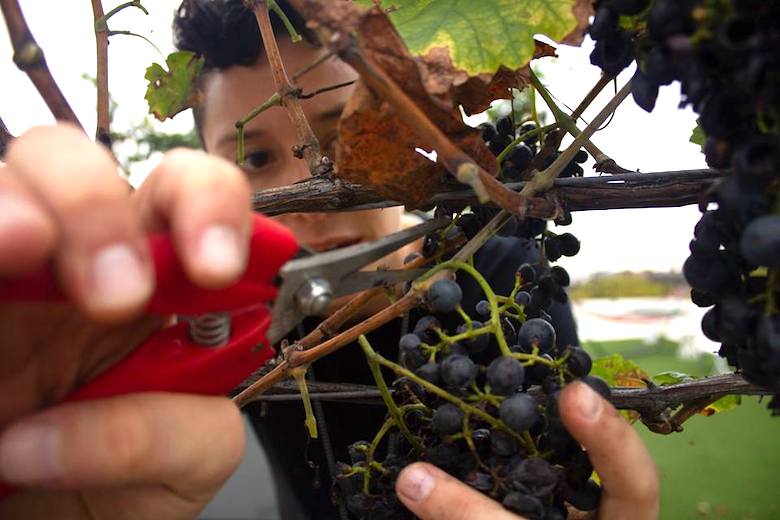
When Chris Maestro moved his vinyl & beer bar BierWax into its Prospect Heights storefront, the previous owner warned him about the grapes. Vines encircled the backyard of the Vanderbilt Avenue business, and without a plan to deal with the grapes, they threatened to take over.
Then came Village Vines.
The forthcoming nonprofit from the team behind Rooftop Reds—the borough’s rooftop vineyard, event space and bar in the Brooklyn Navy Yard—is connecting with people like Maestro across Brooklyn, harvesting grapes from heritage vines and turning them into a “village wine.”
They’ve already collected 120 pounds of grapes, including a bounty from a Clinton Hill homeowner’s backyard, that will make about 15 cases of wine, according to Rooftop Reds founder Devin Shomaker. Once the wine is ready, Village Vines will sell it and donate all of the proceeds to local nonprofits.
“I think Village Vines really has the potential to expand urban agriculture and expand this network of heritage vines,” Shomaker said, leaning on Rooftop Reds’ empty bar on a recent Tuesday morning.
People have been reaching out to Rooftop Reds since the small vineyard opened to the public in 2016, talking about the grapes growing in their yards. Many were left over from previous generations of immigrants, most of them Italian, who kept old-world traditions of growing a family or village wine alive when they came to Brooklyn, Shomaker said. It seemed only natural to do something with all those grapes. To Shomaker and his colleagues like Village Vines director Malcolm Baker, this was an opportunity to revive an old tradition while simultaneously generating funds for community organizations.
Read more: This Rooftop Vineyard Charts a New Course at the Navy Yard
But Brooklynites don’t have to have heritage grape vines growing wild in their yards to contribute to the vision. The organization developed a planter program, designed so businesses and individuals can buy supplies to grow their own vines. The program uses drums filled with Rooftop Reds’ proprietary soil blend, and it relies on Chambourcin and Corot Noir—two French-American hybrid grape varietals, Shomaker said.
Village Vines provides a viticulture class for participants, and will help with any issues along the way, as well as harvesting. The nonprofit will then turn the entire haul into a big batch of red blend, creating a modern-day “village wine.” Grape donors will decide which nonprofits they’d like their portion of the proceeds to support, Baker said, choosing from a list of seven approved partners ranging from City Growers to Emma’s Torch.
The planter program is still in its startup phase; while several have already been sold, Village Vines is just starting to roll out and promote the initiative, Baker said.
There’s a third tier to the organization’s plan, too—growing grapes themselves. Working with the Brooklyn Greenway Initiative, Village Vines will help transform over an acre of waterfront by Carroll Gardens into “the largest urban agriculture initiative” in the city, Shomaker said.
Complete with grape vines—the output of which will feed into the village wine—and 40 rows of hops in collaboration with local breweries, Shomaker said they hope to start in earnest this May after completing a current fundraising drive. It’s a long-term effort with multiple facets, just like Village Vines’ overarching mission. But Shomaker and Baker are patient—you have to be, if you’re in the wine business—and agree that greening Brooklyn, creating community and reinvesting in grassroots organizations is worth it.
Orchestrating so many facets, and relying, in part, on beginner-level vintners and wild-growing vines is certainly ambitious. It’s unclear exactly what the wine will taste like; Village Vines is still compiling the first batch. But given that the goal is to create an unpretentious, red-blend table wine, it’s likely that the team behind “the world’s first commercially viable rooftop vineyard” will pull it off.
To donate your backyard grapes or to join the vine-share program, contact Village Vines.



